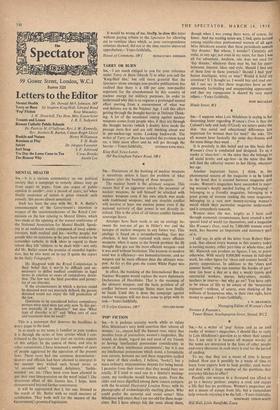Letters to the Editor
Mental Health Dr. Donald Mel. Johnson. MP
Tarry or Burn Sir Stephen King-Hall, Edward Bond `Pop' Fiction Rose Macaulay, J. W. Drawbell, The Hon. Mrs. Esson-Scott
Tenants and Leases J. R. E. Sedgwick Roman Catholic Public Schools Dr. Patricia M. O'Sullivan. Rev. J. W. Kennedy, Rev. Herbert R. Barton, Canon Roger Lloyd
Ruskin and Nature Henry Williamson
Russians at Play T. H. Beale Sakiet Dr. Jacques Forestier , Soft Soap S. F. Ashwood
The Day the Lama Came to Tea Cyrus Brooks
The Reason Why Austin Lee
MENTAL HEALTH
SIR,—It is a curious commentary on our political society that a campaign to remedy abuses may go from paper to paper, from one organ of public opinion to anothr-, over a period of years; yet when finally assurance gif action is given towards such remedy, this passes almost unnoticed.
Such has been the case with "Mr. R. A. Butler's announcement of the Government's intention in respect of the recommendations of the Royal Com- mission on the law relating to Mental Illness, which was made at the opening of the annual conference of the National Association for Mental Health. Speak- ing to an audience mainly composed, of local admin- istrators, both medical and lay--worthy people; but people who on occasions io the past have tended to be somewhat catholic in that ideas in regard to those whom they felt 'subjects to be dealt with'—not only did Mr. Butler renew the promise of remedial legisla- lion, but he also went on to say (I quote the report in the Daily Telegraph): He disagreed with the Royal Commission in their belief that it wolo.d be difficult and un- necessary to define medical conditions in legal terms in relation to cases of compulsory deten- tion. The law was the final guardian and protec- tor of our liberties.
If the circumstances in which a person could be detained were not precisely defined, the person detained could not enjoy the full protection of the law.
Questions to be considered before compulsory powers were used Were not only now 'Is this per- son mentally ill or defective?' but also 'What type of disorder is it?' and 'What sort of care and treatment does he need?'
This is a statement that deserves the headlines in every paper in the land.
In as much as my name is familiar to your readers it is through the series of four articles which I con- tributed to the Spectator last year on various aspects AA this subject. In the course of these, and also in other connections, I have instanced a number of cases of people aggrieved by the operation of the present laws. These cases had one common denominator : ,doctors and officials had been allowed to interpret in the manner they wished such broad terms as 'of unsound mind,' mental deficiency,' 'feeble-
etc. etc. (They have even been allowed to put their 'own interpretation on the word 'mind.') The disastrous effect of this licence has, I hope, been .demonstrated beyond further controversy.
It will be appreciated that I, for one, listened to the words of Mr. Butler with no small measure of satisfaction. They bode well for the success of the Government's promised legislation. It would be wrong of me, finally, to close this letter without paying tribute to the. Spectator for allowing me to ventilate ideas which, as your correspondence columns showed, did not at the time receive universal approbation.—Yours faithfully,


































 Previous page
Previous page